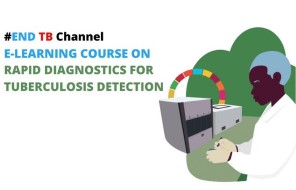Rapid diagnostics for tuberculosis detection
Ensuring universal access to TB care relies on the rapid diagnosis of TB, detection of drug resistance, and on the timely initiation of an effective treatment regimen. These require access to rapid and accurate tests, including drug susceptibility testing for all TB patients.
This course will provide you with the knowledge and skills needed to implement WHO-recommended TB tests and algorithms. It includes the latest recommendations for novel tests for TB diagnosis and detection of drug resistance, as well as the most recent WHO policy guidance for the use of those tests. The course also describes the processes and steps for implementing a new diagnostic test for routine use within the TB diagnostic network.
Overview:
This e-learning course has been developed by WHO. It is a comprehensive, self-paced, online course that follows the content of the WHO operational handbook on tuberculosis: Module 3: Diagnosis – rapid diagnostics for tuberculosis detection – 2021 update.
Course duration:
4 To 5 hours
What you’ll learn; Who this course is for
Explain the rationale for delivering diagnostic services and illustrate the key components and organization of a TB diagnostic network in different settings
Describe the steps to be implemented when introducing a new diagnostic tool into an existing laboratory network
Describe the TB diagnostic algorithms that incorporate the most recent WHO recommendations for detecting TB and DR-TB and outline considerations needed to be made for the implementation these new algorithms
Explain indicators and targets and interpret results for performance monitoring of the laboratory network.
This e-learning course is intended for people who provide guidance to countries on implementing WHO recommendations on TB
For example, national programme managers, managers of laboratory services, technical staff at ministries of health, WHO staff, staff of technical agencies, consultants and anyone else serving a similar role in countries and major subnational units. It is assumed that you have experience in working on TB and are familiar with WHO TB guidelines.
User Reviews
Be the first to review “Rapid diagnostics for tuberculosis detection”
You must be logged in to post a review.







There are no reviews yet.